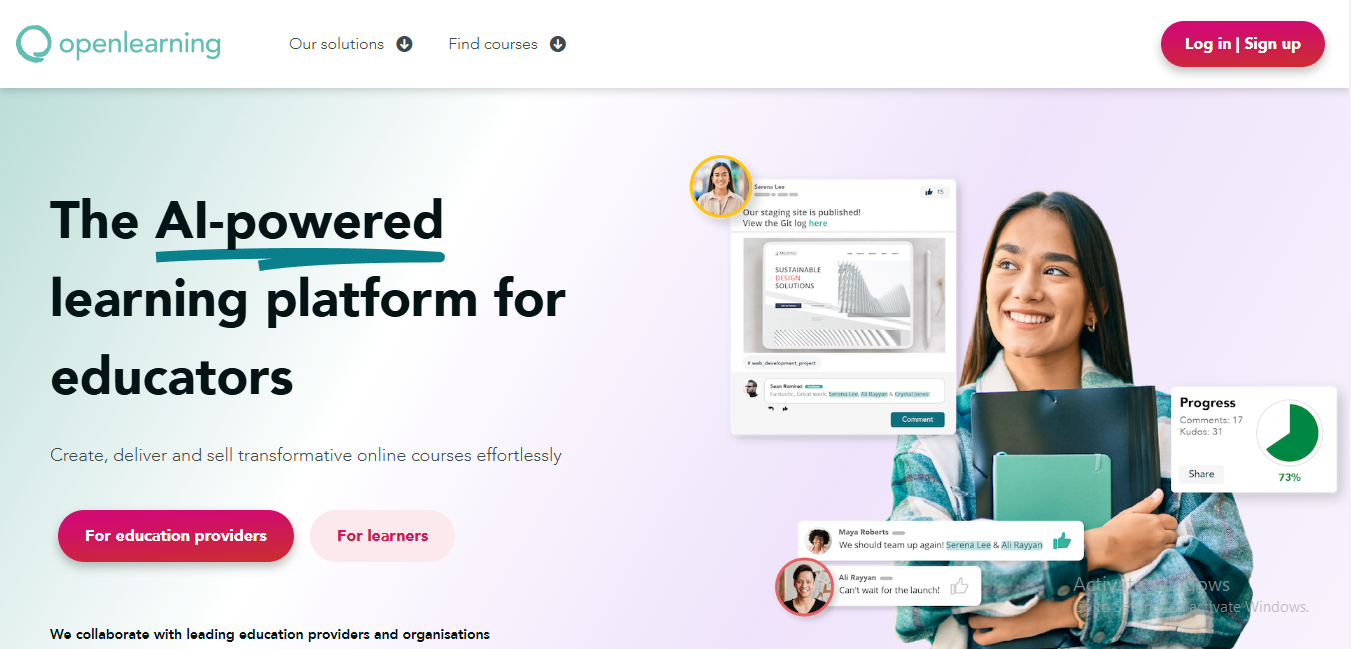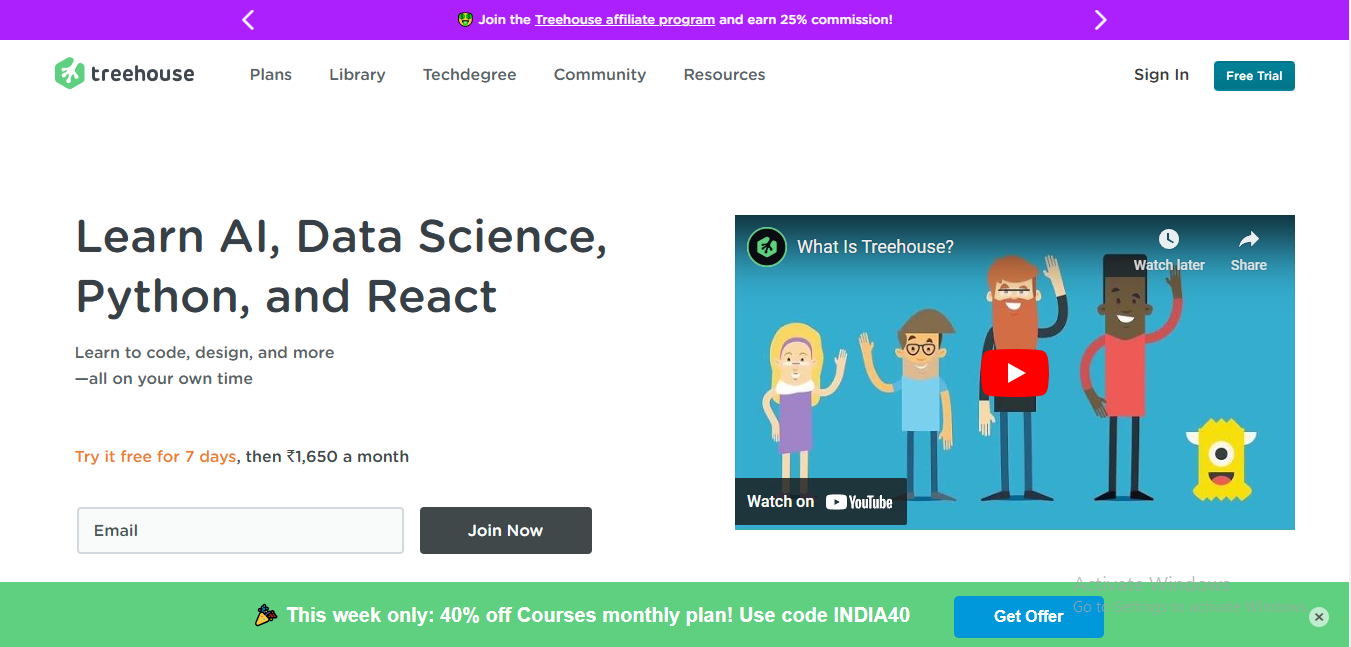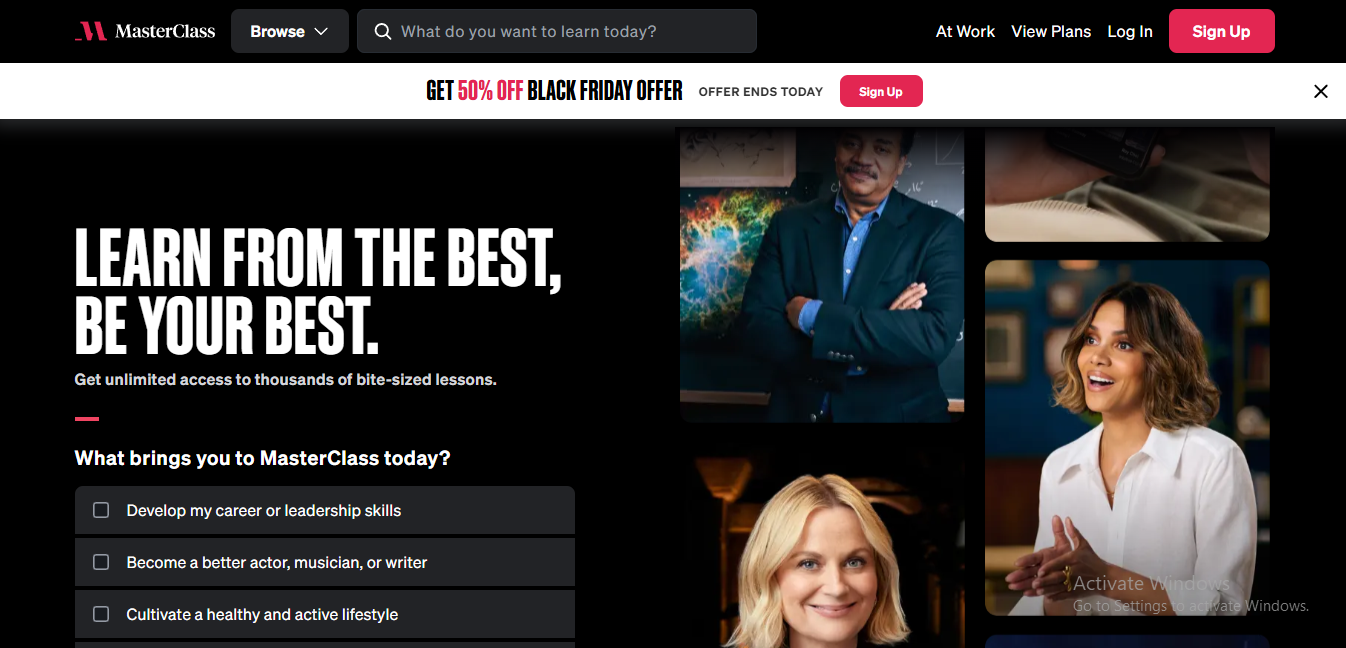Education has transformed dramatically in recent years. Online learning platforms now dominate as hubs for skill-building and knowledge expansion. Whether you want to advance in your career, learn a new subject, or explore a passion, the top learning platforms open limitless possibilities.
This guide unpacks what online learning platforms are, lists the top 10 for 2025, and shares tips for choosing one. Let’s dive in and help you make informed decisions for your learning journey.
An online learning platform serves as a virtual classroom. Learners access lessons, materials, and exercises over the Internet. These platforms cover topics ranging from technology to the arts, business, and more.
Also known as e-learning portals, they simplify learning for everyone. You can gain certificates, polish skills, or even earn degrees. Flexible schedules and engaging formats make these platforms a favourite among students and professionals alike.
Here are the 10 best online learning platforms for courses:

Thinkific helps creators design and sell free teaching programmes and courses with ease. It’s a platform for building customised learning experiences. You don’t need technical skills. Its drag-and-drop editor makes course creation simple. Thinkific works for individuals, businesses, and educators alike. It supports various media like videos, quizzes, and PDFs. It’s great for monetising skills or teaching a team. You can also explore Thinkific Academy for tips on pricing and marketing courses. Thinkific is all about flexibility, letting creators focus on content, not the tech.
| Pros | Cons |
|---|---|
|
|
Thinkific is perfect for those who want to create and sell unique courses. It’s reliable, flexible, and great for small businesses or creators.
| Course | Price |
|---|---|
| Basic Get the key features and expert support you need to grow your learning business. | $36/mo |
| Start Access tools designed to increase customer engagement and accelerate revenue. | $74/mo |
| Grow Take your learning business further with added support, expanded limits, and advanced commerce tools to increase revenue. | $149/mo |
| Thinkific Plus Scale with pro features, enterprise tools, and tailored support. Book a call for your custom quote. | Talk to Sales |
For more details, visit their website.

Coursera offers online courses from top universities like Yale and Stanford. It has options for certificates and degrees in various subjects. You can learn skills for career growth or explore new hobbies. Courses are self-paced, allowing flexibility for learners. It offers content in arts, tech, science, and more. Certificates from Coursera are widely recognised by employers. It’s a great choice for formal education without high costs. Subscriptions offer access to many courses, making it budget-friendly for consistent learners.
| Pros | Cons |
|---|---|
|
|
Coursera bridges the gap between traditional education and affordability. It’s ideal for learners seeking credentials from trusted institutions.
Courses start at £8. Subscriptions are £47/month or £320/year.
For more details, visit their website.

LinkedIn Learning focuses on professional skills. It offers courses in business, technology, and creativity. Over 17,000 courses are available. You can easily add certificates to your LinkedIn profile, boosting job prospects. Lessons cover practical topics like software tools and team management. It’s great for career-oriented learning. Subscriptions include access to LinkedIn Premium for job searching and networking. Businesses can also purchase team subscriptions for employees. It’s an all-in-one platform for professionals looking to upskill.
| Pros | Cons |
|---|---|
|
|
LinkedIn Learning is ideal for career-focused professionals. It combines learning with networking opportunities.
£33/month or £200/year.
For more details, visit their website.

Skillshare is designed for creative learners. It has courses on topics like design, photography, and crafts. Courses are taught by real-world creatives, making lessons relatable. The online training platform is project-based, helping learners apply new skills quickly. It’s flexible and accessible, with a mobile app for learning on the go. However, most courses are introductory and lack depth. It’s great for hobbyists or professionals seeking creative inspiration. Skillshare’s annual subscription is affordable for its extensive library.
| Pros | Cons |
|---|---|
|
|
Skillshare stands out for creative learners. It’s simple, accessible, and packed with fun, hands-on projects.
£12/month or £145/year.
For more details, visit their website.

edX offers university-level courses from institutions like Harvard and MIT. It’s a go-to for formal education at a lower cost. The online learning platform focuses on science, technology, and business topics but also offers humanities courses. You can earn certificates, professional credentials, or even full degrees. Most courses are self-paced, giving flexibility to learners. The courses are well-structured and include top-notch content. edX is great for professionals and students looking to deepen their knowledge.
| Pros | Cons |
|---|---|
|
|
edX is a trusted platform for learners who want credible education from world-renowned universities.
Free courses available. Certified courses cost £40–£250. Degree programmes are £800+.
For more details, visit their website.

OpenLearning focuses on collaborative and community-driven learning. It’s widely used in Australia but serves learners worldwide. Courses are interactive, promoting engagement through discussions and group work. It offers micro-credentials that can lead to university credits. The platform is powered by AI to enhance learning experiences. It’s particularly useful for professional and academic development. OpenLearning is ideal for those who value a mix of education and social interaction.
| Pros | Cons |
|---|---|
|
|
OpenLearning combines social interaction with quality education. It’s great for learners seeking a collaborative environment.
Free courses available. Microcredential courses start at £120.
For more details, visit their website.

Udemy has the largest library of online courses, covering personal and professional skills. Courses range from £8 to £160, making learning accessible to all budgets. You pay per course, with no subscription required. Content varies from tech to personal development. However, the quality depends on the instructor, as there’s minimal vetting. Udemy’s flexibility lets you learn at your own pace. It’s perfect for one-off learning or exploring new hobbies.
| Pros | Cons |
|---|---|
|
|
Udemy’s affordability and vast options make it a favourite for learners of all interests.
| Course | Price |
|---|---|
| Personal Plan For You (Individual) | S$18.70 /month |
| Team Plan For your team 2 to 20 people | S$40.00 /month/user |
| Enterprise Plan For your whole organisation More than 20 people | Contact Sales |
For more details, visit their website.

Treehouse is all about coding and tech skills. It’s beginner-friendly, offering courses on web development, cybersecurity, and app design. Lessons are project-based, ensuring hands-on learning. Treehouse includes a built-in text editor for coding practice. Techdegree programmes offer certifications, preparing learners for tech careers. Its affordable pricing makes it accessible for aspiring developers. However, its focus is limited to programming.
| Pros | Cons |
|---|---|
|
|
Treehouse is ideal for tech enthusiasts and aspiring developers. It’s simple, practical, and effective.
| Course | Price |
|---|---|
| Courses Give coding or design a try | $ 1.33/mo |
| Courses Plus Level up your learning with extras | $ 2.67/mo |
| Techdegree Get certified in our job-ready bootcamp | $ 199/mo |
For more details, visit their website.

MasterClass offers courses taught by industry leaders and celebrities. Topics include cooking, acting, writing, and leadership. Videos are engaging and high-quality, with expert insights. Courses are introductory, focusing on inspiration rather than mastery. It’s ideal for hobbyists or those seeking unique perspectives. Subscriptions are affordable and offer access to all courses. MasterClass is perfect for curious learners looking for expert advice.
| Pros | Cons |
|---|---|
|
|
MasterClass combines expert insights with stunning visuals, making it a standout for inspiration.
| Course | Price |
|---|---|
| Standard 1 device No offline mode | $10.70 |
| Plus 2 devices Offline mode | $16.05 |
| Premium 6 devices Offline mode | $21.40 |
For more details, visit their website.

Khan Academy is a free, non-profit platform offering lessons for all ages. It’s best known for K-12 education but also includes test prep and professional skills. Subjects include maths, science, and economics. Lessons are interactive, with quizzes and gamified elements. It’s a great resource for students, parents, and educators. Khan Academy supports foundational learning and lifelong education at no cost.
| Pros | Cons |
|---|---|
|
|
Khan Academy makes high-quality education free for everyone. It’s a gift to lifelong learners.
Free.
For more details, visit their website.
In 2025, the growing accessibility and diversity of the best e-learning platforms have revolutionised education, offering learners the opportunity to gain new skills and knowledge from anywhere in the world. Whether you’re looking to develop professional skills, explore creative hobbies, or achieve academic goals, there’s a platform tailored to your needs. By understanding your objectives and preferences, you can select the right platform to enhance your learning experience and unlock your potential. Online education has never been more empowering—start your journey today!
Pick platforms with relevant courses, fair pricing, and good reviews. Define your goals first to narrow your choices.
Coursera and Udemy rank among the most popular due to their vast offerings and global reach.
Focus on your needs, budget, and learning style. Test free trials to find the best fit.
E-learning portals host educational content online. They provide tools and courses for skills development and academic learning.
Stay connected and receive updates directly in your inbox